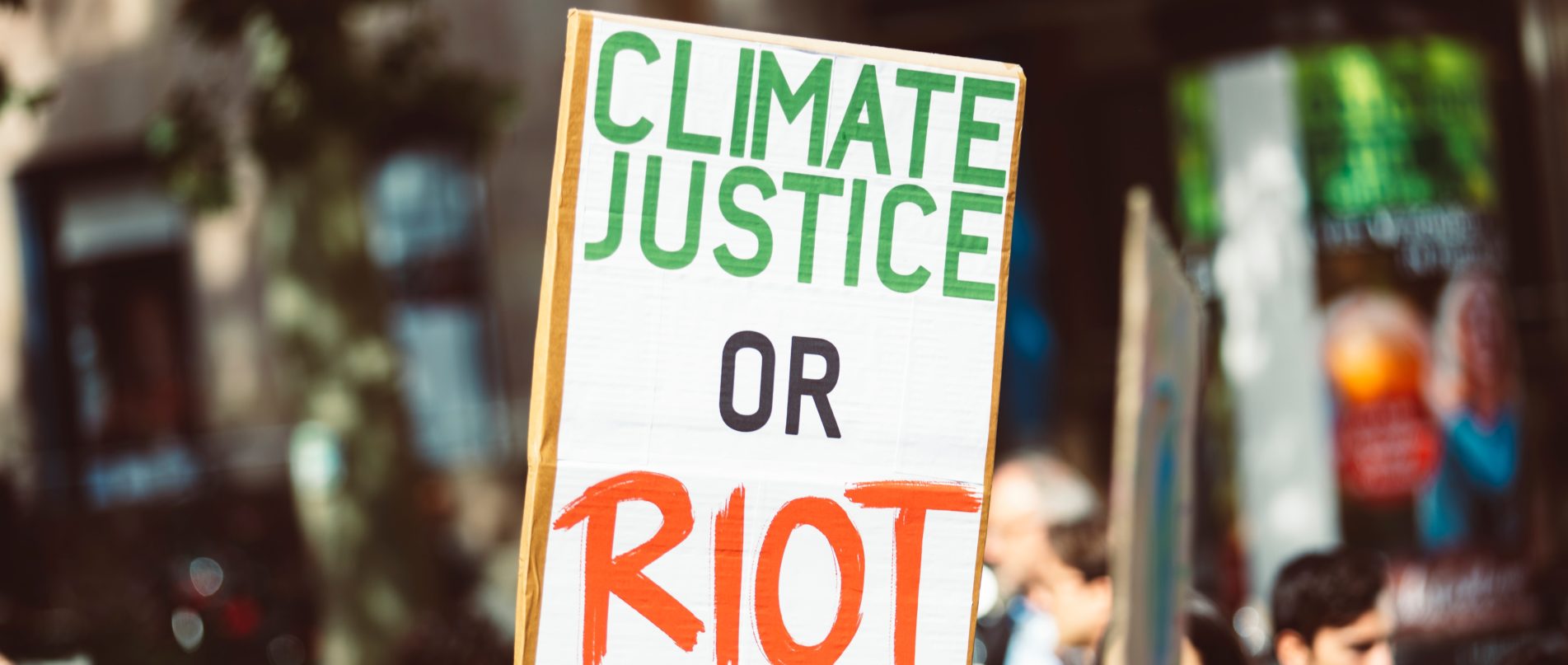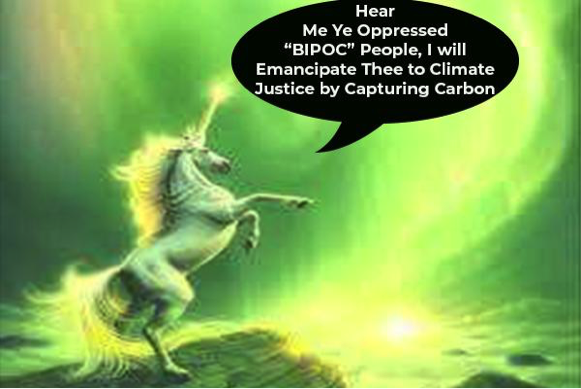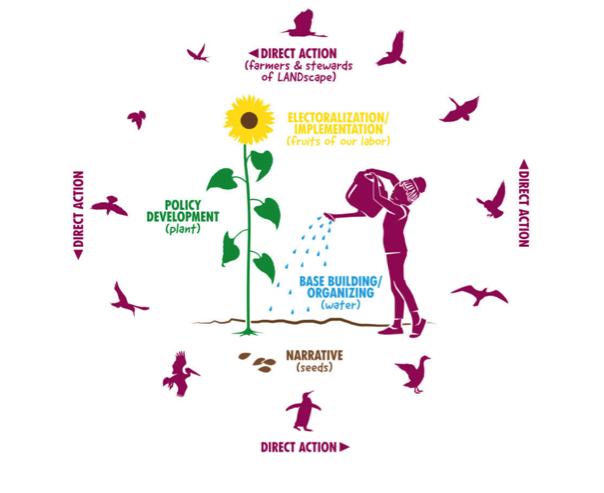
Prompt Images
Colonizing Calamity: Why Anglocentrism Exacerbates the Climate Crisis (Or, “Not This White Jesus Shit Again”)
So here’s a doctrine that may shock you… the white-led climate community too often manifests as much inertia for climate justice as the fossil fuel cartels.
And too often, due to Anglocentrism, climate activism is what hip hop and the blues would sound like if those forms of music were created by white folk: vacuous, played-out lyrics over beats on the one and the three about suffering in the suburbs, and Kenny G saxophone solos that sound like soggy cotton candy dipped in bad mayonnaise. In short, sonic detritus. Should you actually want to hear what this sounds like, watch Elvis’s last three or four performances before he bought the farm, or went into hiding with Hoffa.
Please let me elucidate the main point of my literary Ted Talk that I appreciate you attending.
In his landmark work, The Great Derangement, Ahmitav Ghosh proclaims a most veracious aphorism, “…the climate crisis is also a crisis of culture, and thus of the imagination.” There are many takeaways from Brother Ghosh’s terse offering, but since I am the one writing this shit, here is the takeaway that’s most salient as you’re reading:
As long as the climate crisis is articulated solely or primarily through an Anglocentric lens, it will never be dismantled as we inch ever closer to total global entropy.
I will even go as far to say that Anglocentrism is anathema to action on climate justice because it lacks a synthesis of narratives that engenders the required imagination to develop, implement, and distribute solutions at scale. This is something we need the nonprofit apparatus and its funding arms to embrace and comprehend as fast as we need to keep fossil fuels in the ground.
Earlier this week, the International Panel on Climate Change (IPCC) released a report on the state of the climate crisis, which pretty much revealed that we are rapidly approaching (fuck all)2 territory. The report is so dire that U.N. Secretary General, referred to it as, “code red for humanity.”
Unfortunately, the subsequent commentary on the IPCC report may as well be characterized as, “Anglocentrism Unleashed: Part Infinity.”
A quick review of nearly all the talking heads pontificating about the report’s takeaways revealed that said heads were whiter than Phish heads at one of their concerts in Wyoming (but not as white as their show tonight in Atlantic City because I will be in attendance).
It’s as if mainstream media has embraced a paradigm that discussions on the climate crisis, climate policy, and requisite climate action is bereft of verisimilitude unless they are dominated by the presence of white folk. This mode of thinking must be confronted and dismantled with velocity, for it’s been clear to Indigenous, Black, brown, and Asian (IBBA) climate justice practitioners from some time that solely Anglocentric approaches to climate solutions conversely tend to increase environmental justice problems. And if you think that Anglocentrism is only transmitted by the Fox News-es of the world, you’re experiencing a bigger momentary lapse in reason than when Radiohead released their album, King of Limbs (Fight me, that album fucking sucks).
MSNBC—the allegedly “liberal” network—has not had one IBBA guest on any of its programs to discuss the climate crisis since the most recent IPCC report dropped on wax.
In her seminal collection of writings, Playing in the Dark: Whiteness and the Literary Imagination, the prophet Toni Morrison offers, “These images of impenetrable whiteness need contextualizing to explain their extraordinary power, pattern and consistency. Because they appear almost always in conjunction with representation of Black or Africanist people who are dead, impotent, or under complete control.”
More times than not, the Anglocentric climate narrative depicts IBBA communities who experience disproportionate impacts of global warming as indigent, itinerant, or otherwise incapable of developing solutions without the tutelage of the white climate experts. Later in this piece, I will explain why this mode of thinking is as feckless as putting on a Dubstep mixtape during an Omega Psi Phi step show. That said, when the holders of the dominant climate narrative continue to portray frontline communities in this way, they vindicate Toni Morrison’s prescient observation. As if she needs vindication.
Even when MSNBC did post an article reacting to the IPCC report by Hayes Brown, one of their Afircan American opinion columnists, the citations and references included solely white “experts” and writers.
In fact, not one IBBA voice was featured.
Kwame Ture (formerly known as Stokely Carmichael) offers an admonishment of the pitfalls of Anglo-conformity and Anglocentrism in his timeless book, Black Power: The Politics of Liberation, stating, “Our point is that no matter how “liberal” a white person might be, he cannot ultimately escape the overpowering influence—on himself and on black people—of his whiteness in a racist society.” Ture continues, “We do not believe it possible to form meaningful coalitions unless both or all parties are not only willing but believe it absolutely necessary to challenge Anglo-conformity and other prevailing norms and institutions.”
The consequences of Anglocentrism are vast and expansive.
From a narrative standpoint, Anglocentrism is pernicious because of the ideas it evokes, especially in the context of solutions to address and ultimately dismantle the climate crisis. We’re hearing more from white men riding green unicorns who offer false climate justice solutions like carbon [dioxide] capture, net zero emissions, carbon offsets, and hydrogen combustion than the folk who brought us true solutions rooted in Indigenous wisdom like Just Transition, Energy Democracy, Food Sovereignty, and Just Recovery. Rick James may have known about cocaine, but he clearly had no idea that colonization is even more addictive and THE hell of a drug, fucking us up for five centuries and counting.
It must also be pointed out that Anglocentrism is always a slippery slope to neoliberalism, which contributes to the climate crisis.
Let us once again use our favorite exemplar of liberal networks, MSNBC. In a recent interview on one of the network’s flagship programs featuring renowned climate scientist Michael Mann and head of the neoliberal think tank, Council on Foreign Relations Richard Haass, Anglocentrism was on full display. At one point during the interview, Haass suggested that China is the main culprit of the climate crisis and that we must defer to European-based solutions to get us out of it.
To Mr. Haass, I respectfully riposte that the U.S. blaming China for climate change is like MC Hammer blaming Vanilla Ice for bad hip hop.
Especially because the U.S. still has the highest amount of global emissions per capita. But this is the classic modus operandi of Anglocentrism: misdirect, triangulate, and exculpate the perpetrators while shining the light on a newly generated villain who is the “true” protagonist for all the suffering. There’s a word for that kind of shit behavior.
The whitewashing of the climate narrative also encompasses languorous climate change related taxonomy including feckless phrases like:
- “Decarbonize” – No we don’t want to decarbonize, that’s what fucking Thanos did. We want to reduce and extirpate dirty greenhouse gas emissions.
- “Anthropocene” – (That the Anthropocene, at its core, is a fundamentally bourgeois concept should surprise no one. After all, it tells us that behind the current disastrous state of world affairs is the Anthropos. It’s a trick as old as modernity, the rich and powerful create problems for all of us, then tell us we’re all to blame)
- “Net zero emissions” – A dumb ass idea not even rooted in science that suggests we can slash, burn, and emit all we want as long as we plant some fucking trees while micturating on Tribal/Indiegnous sovereignty. Who are the science deniers again, white liberals?
That said, among the most deleterious aspects of an alabaster climate narrative is how much it fuels the school of white saviorism, otherwise known as the “progressive” establishment.
“Batman is the Problem” – Jordan Flaherty
If you turned off the volume while watching coverage of climate change, you could make yourself believe that you’re watching the breakdown of a rodeo competition, it’s that whitewashed. This is problematic because the coverage, among other things, evokes the idea that white folk and white folk alone can solve the problem. Sound like anyone else you know, perhaps an orange skinned, tight toupee- sporting megalomaniac?
Jordan Flaherty in his diggidy book, No More Heroes, adroitly breaks down the fallacy of white saviorism. “The savior mentality means that you want to help others but are not open to guidance from those you want to help.” He goes on to say, “The savior always wants to lead, never to follow. When the people they have chosen to rescue tell them they are not helping, they think those people are mistaken. It is almost taken as evidence that they need more help.”
This mode of thinking actually perpetuates the climate crisis in that it vindicates a colonizer mindset and uplifts a de facto iteration of white supremacy.
The journey to mutual and universal climate justice is long, and it does not traverse vanilla vernacular pathways nor perambulate the voices of those most impacted: It centers and amplifies them. And look, I’m not trying to take money out of the pockets of any of the majority white climate journalists, nor their “celebrity activist” status—good for y’all, Mazel Tov—I even consider some of y’all friends and/or acquaintances. AND, yes, y’all need to do better, especially those climate writers that refer to themselves as socialists. How the fuck can you truly be about distrubuting the wealth and resources equitably when you won’t even actively distribute the narrative equitably? This variety of vanilla cream-filled “socialism” is simply not going to get the job done anymore than a Twinkie provides the requisite amount of nutrition to sustain a hum(a)n body.
Ergo, I challenge these journalists, the mainstream media trasnsmitting their work, and the entire climate community to consider a question asked by Françoise Vergès: “What methodology is needed to write a history of the environment that includes slavery, colonialism, imperialism, and racial capitalism?”
This question cannot be answered from a lens of Anglocentrism. Therefore, the white-led climate community and its acolytes need to make a key choice and quickly:
Y’ALL can either maintain your facade of white “supremacy” or WE can have climate justice, but not both.
I’ve always thought about what it would look like for white folk to actually reject that version of whiteness. It could be as simple as a new ALS ice bucket challenge in which a white person burns their “whiteness club card” (asking seriously, white people, do these cards actually exist?) on social media and then challenges three of their white friends to do the same. And, since the U.S. professional activism milieu has a proclivity for embracing the prefigurative over actual power-building through principled and deep organizing, I bet we can find a funder willing to invest in that shit.
Colonization is one of the root causes of the climate crisis.
And if Eyal Weizman is correct in his assertion that “the current acceleration of climate change is not only an unintentional consequence of industrialization. The climate has always been a project for colonial powers, which have continually acted to engineer it,” this is a challenge to ostracize all elements of colonization in our “movements.” This starts, and perhaps even ends, with our narrative, which represents a key variable in a concept I developed called the “Five Points of Intervention for Emancipation and Mutual Liberation.”
If the narrative is tainted, everything that grows out of it will be, ultimately, bereft of efficacy.
We must be collective in a way that mutually distributes the narrative and true solutions for the climate crisis or we will continue to mutually bifurcate (or poly-furcate) ourselves on a road to global climate perdition. This means rejecting whiteness and Anglocentrism. It also means we have to collectively refute Ture’s assertion that “most liberal groups with which we are familiar are not so willing at this time. If that is the case, then [coalitions are] doomed to frustration and failure.”
Bottom line, until the climate community is ready for a Black coffee narrative with Brown sugar and no cream, it will never be ready to win.





